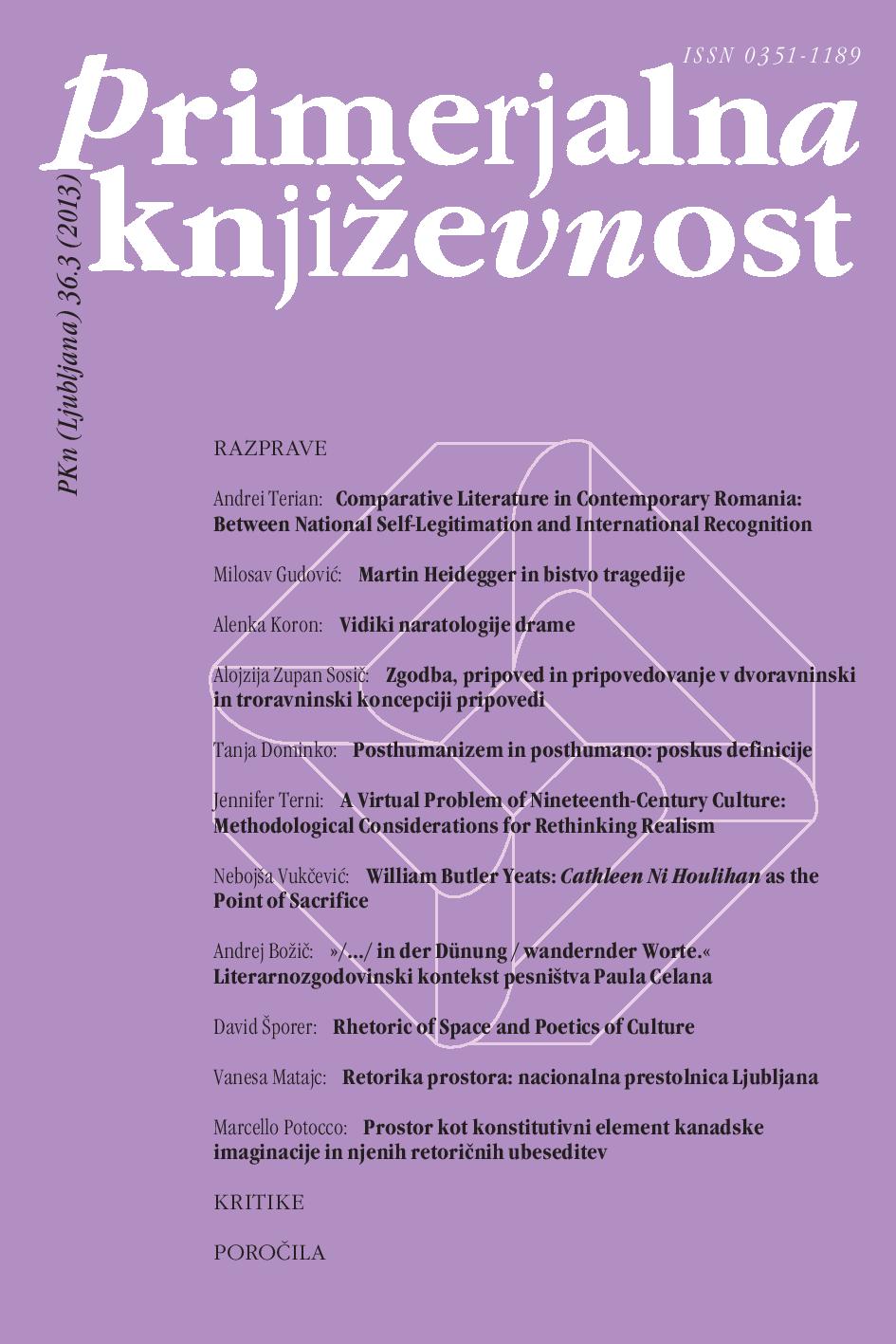Martin Heidegger and the Essence of Tragedy
Keywords:
philosophy of literature, hermeneutics, ontology, tragedy, myth, soul, Heidegger, Martin, AristotleAbstract
This article discusses Heidegger’s hermeneutical encounters with the tradition of ancient drama. His phenomenological interpretations of tragedy are a good opportunity to study the classical aesthetic approach to literature. In the first part of the essay, the author discusses Heidegger’s “hidden critique” of some fundamental statements of Aristotle’s Poetics, in which an implicit reevaluation of the term mýthos is emphasized. Stagirite’s theory of drama (and most of its later receptions) use this term to connote a narrow creator’s story; that is, an “autonomous” artistic conception submitted to laws of probability and necessity. As it turns out, the aesthetic method, in which the tragedy is treated as an isolated object and as a sort of a stimulus of emotional purification (kátharsis), had a crucial influence on the first “declination of the tragic” – on the departure from the truthful meaning of mythical reality in Antiquity. Tragedy is possible as a work of art only in a world order that is truly filled with myth. However, Heidegger’s hermeneutics of tragedy are not limited to the artistic text or theatrical play as such. This philosopher sought to find and elucidate the origin (Ursprung) of dramatic expression and impression. Therefore, the author deconstructively highlighted the difference between the Aristotelian concept of myth (understood as “the arrangement of events” and the soul of tragedy) and Heidegger’s concept of the singular Event (Ereignis). This (meta)ontological framework is the main condition of all imaginable particular anecdotes and mythical stories about humans and gods. If one forgets this primary meaning of myth as a linguistic/historical occurrence of Being, the interpretation falls into the basic declination of the soul of tragedy. The second part of the article considers another, no less important, aspect of Heidegger’s interpretations of drama. In addition to the aesthetic oblivion of tragedy, there is another “declination”, in which the tragedy of soul comes to the fore. In this context, the human Being is defined as to deinón, a violent being, that directs itself against the power of overruling Being. The final result of this existential resistance is death. Slavery in self-sufficient immanence, in the jaws of necessity, may be removed only by overcoming and transforming the mortal human nature. The hermeneutical treatment of this ontological turn demands new, more extensive research, in which the duality of declinations is enriched by later, decisive, and essential changes in the mythical horizon of Christianity.References
Aristotel. Nikomahova etika. Prev. Kajetan Gantar. Ljubljana: Slovenska matica, 2002.
– – –. O duši. Prev. Valentin Kalan. Ljubljana: Slovenska matica, 1993.
– – –. O pesniški umetnosti. Prev. Kajetan Gantar. Ljubljana: Študentska založba, 2005.
Brogan, Walter. A. Heidegger and Aristotle: The Twofoldness of Being. New York: State University of New York Press, 2005.
Diels, Hermann. Kranz, Walther. Fragmenti predsokratikov 1. Ur. Gorazd Kocijančič. Ljubljana: Študentska založba, 2012.
Eagleton, Terry. Sveti teror. Prev. Seta Knop. Ljubljana: Rotosi, 2008.
Fichte, Jochan Gotlieb. Izbrani spisi. Prev. Doris Debenjak. Ljubljana: Slovenska matica, 1984.
Gadamer, Hans-Georg. Pohvala teoriji: filozofski eseji. Prev. Saša Radojčić. Podgorica: Oktoih, 1996.
– – –. Resnica in metoda. Prev. Tomo Virk. Ljubljana: Literarno-umetniško društvo Literatura, 2001.
Hegel, G. W. F. Fenomenologija duha. Prev. Božidar Debenjak. Ljubljana: Društvo za teoretsko psihoanalizo, 1998.
Heidegger, Martin. Der Ister. Gesamtausgabe, Bd. 53. Frankfurt ob Majni: Vittorio Klostermann, 1984.
– – –. Izbrane razprave. Prev. Ivan Urbančič. Ljubljana: Cankarjeva založba, 1967.
– – –. Uvod v metafiziko. Prev. Aleš Košar. Ljubljana: Slovenska matica, 1995.
– – –. Wass heißt Denken. Gesamtausgabe, Bd. 8. Frankfurt ob Majni: Vittorio Klostermann, 2002.
– – –. Wegmarken. Gesamtausgabe, Bd. 9. Frankfurt ob Majni: Vittorio Klostermann 2004.
Hölderlin, Friedrich. Werke und Briefe, Bd 2. Frankfurt ob Majni: Insel Verlag, 1969.
Kaufmann, Walter. Tragedija i filosofija. Prev. Jelena Stakić. Novi Sad: Književna zajednica, 1989.
Kozak, Krištof Jacek. Privlačna usodnost: subjekt in tragedija. Ljubljana: Mestno gledališče ljubljansko, 2004.
Lozar, Janko. Vedrenje vedrine. Ljubljana, Študentska založba: 2012.
Lukács Georg. Die Seele und die Formen. Berlin: Egon Fleischel, 1911.
Nietzsche, Friedrich. Rojstvo tragedije iz duha glasbe. Prev. Janko Moder. Ljubljana: Karantanija, 1995.
Platon. Zbrana dela II. Prev. Gorazd Kocijančič. Celje: Mohorjeva družba, 2004.
Schiller, Friedrich. Einleitung in die Philosophie der Mithologie. Schellings Werke, Bd. 6. München: Beck, 1965.
– – –. O estetski vzgoji človeka: v vrsti pisem. Prev. Štefan Vevar. Ljubljana: Študentska založba, 2003.
Scheler, Max. Wom Umschturz der Werte. Leipzig: Der Neue Geist Verlag, 1919.
Schmidt, Dennis J. On Germans and Other Greeks. Bloomington, Indianapolis: Indiana University Press, 2001.
Schopenhauer, Arthur. Svet kot volja in predstava. Prev. Alfred Leskovec. Ljubljana: Slovenska matica, 2008.
Sofoklej. Antigona. Kralj Oidipus. Prev. Anton Sovre. Ljubljana: Delo/Intelego/Študentska založba, 2006.
Steiner, George. Antigones. Oxford: Clarendon Press, 1984.
– – –. Smrt tragedije. Prev. Katarina Jerin. Ljubljana: LUD Literatura, 2002.
Szondi, Peter. Versuch über das Tragische. Frankfurt ob Majni: Insel Verlag, 1961.


